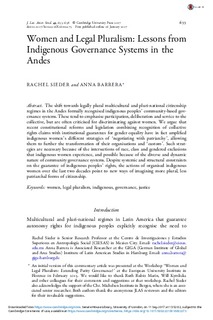Women and Legal Pluralism: Lessons from Indigenous Governance Systems in the Andes
Journal article, Peer reviewed
Permanent lenke
http://hdl.handle.net/11250/2475448Utgivelsesdato
2017-01-01Metadata
Vis full innførselSamlinger
- Publications [1484]
Sammendrag
The shift towards legally plural multicultural and pluri-national citizenship regimes in the Andes formally recognised indigenous peoples’ community-based governance systems. These tend to emphasise participation, deliberation and service to the collective, but are often criticised for discriminating against women. We argue that recent constitutional reforms and legislation combining recognition of collective rights claims with institutional guarantees for gender equality have in fact amplified indigenous women's different strategies of ‘negotiating with patriarchy’, allowing them to further the transformation of their organisations and ‘custom’. Such strategies are necessary because of the intersections of race, class and gendered exclusions that indigenous women experience, and possible because of the diverse and dynamic nature of community governance systems. Despite systemic and structural constraints on the guarantee of indigenous peoples’ rights, the actions of organised indigenous women over the last two decades point to new ways of imagining more plural, less patriarchal forms of citizenship. Spanish abstract La transición hacia regímenes multiculturales y plurinacionales en los Andes formalmente reconoció a los sistemas comunitarios de gobierno de los pueblos indígenas. Estos tienden a enfatizar la participación, deliberación y el servicio al colectivo, pero son con frecuencia criticados por discriminar a las mujeres. Argumentamos que las reformas constitucionales y otras legislaciones recientes que combinan el reconocimiento a las demandas de derechos colectivos con las garantías institucionales a la igualdad han posibilitado diferentes estrategias de las mujeres indígenas de ‘negociar con el patriarcado’, a la vez permitiéndoles avanzar en la transformación de sus organizaciones y de la ‘costumbre’. Dichas estrategia
